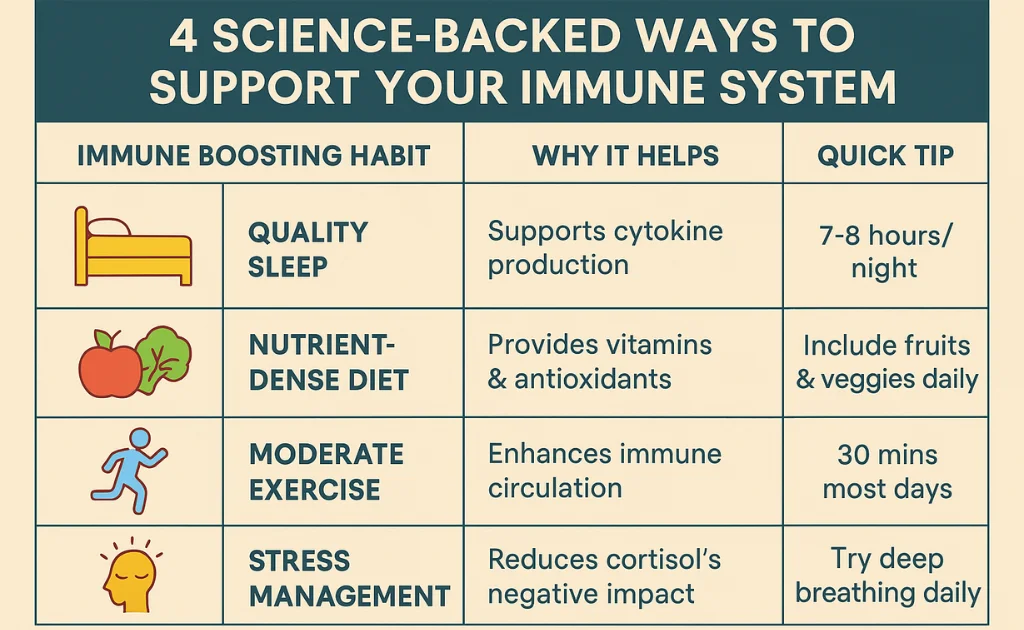To be honest, how to increase immune system naturally is something we don’t usually think about much—until cold season hits or a nasty bug makes the rounds. Then suddenly, boosting immunity feels urgent. In my experience (both personally and from working with clients), people often look for “quick fixes” when the truth is… immunity works like a garden. You don’t water it only when the plants are wilting—you nurture it every day.
Let’s talk about what actually works. And I promise, I won’t toss around fluffy advice like “just eat healthy and exercise.” You already know that. Let’s go deeper—with examples, logic, and what real research suggests.
Table of Contents
Why Your Immune System Needs Daily Care
Your immune system isn’t just “one thing.” It’s an entire army—white blood cells, antibodies, lymph nodes, your gut, even your skin—all working 24/7 to keep out invaders. Imagine a castle with guards, walls, watchtowers, and archers. If one piece weakens, the whole defense is shakier.
The thing is, immunity declines slowly over time if neglected. (You don’t notice it until you’re suddenly catching colds left and right.) That’s why “boosting” immunity isn’t really about sudden spikes—it’s about giving your body long-term reinforcements.
4 Natural Ways to Increase Your Immune System (That Actually Work)
I’m not going to give you a never-ending list here. Just the top 4 things I’ve seen make a difference (backed by science, not trends).
1. Prioritize Sleep Like Your Life Depends On It
I get it—sleep seems “optional” when life is busy. But it’s arguably the most powerful (and free) immune booster you have. During deep sleep, your body produces cytokines—proteins that help fight infection and inflammation.
Real-world tip?
Set a wind-down alarm 30 mins before bed. That gentle buzz reminds you to log off, dim lights, and calm down. 7–8 hours is the sweet spot for most adults.
2. Feed Your Gut, Feed Your Immunity
Here’s something people forget: about 70% of your immune system lives in your gut. Yep, those trillions of microbes lining your intestines have a direct say in how strong your immunity is.
I’ve noticed that folks who naturally eat fiber-rich, colorful foods rarely get sick as much. Coincidence? Probably not.
What to do?
Aim for a variety of fruits, veggies, beans, and fermented foods (like yogurt or sauerkraut) daily. These nourish your gut flora—and happy gut flora equals happy immunity.
3. Move Your Body (But Don’t Overdo It)
Moderate exercise boosts circulation, which helps immune cells patrol your body more efficiently. Think of it like mobilizing more security guards around the castle.
Important:
I’m saying moderate here. I’ve seen hardcore marathoners actually get more colds because chronic overexertion temporarily suppresses immunity.
Aim for:
A brisk 30-minute walk, bike ride, or yoga flow most days of the week. That’s plenty.
4. Stress Less (Or At Least, Stress Smarter)
I won’t pretend you can avoid stress. (Frankly, life throws curveballs constantly.) But long-term, sky-high cortisol weakens your immune defenses. It’s like slowly depleting your army’s morale.
Personally, I’ve found deep breathing, short mindfulness breaks, and even short walks outside calm me far better than scrolling social media. You might experiment with what works for you.

Small Extras That Might Help (Optional but Handy)
Okay—so if you’ve got the basics down, here are a couple “bonus” tools that, in my experience, don’t hurt:
- Vitamin D: Many folks are low, especially in winter. A blood test can confirm it.
- Zinc & Vitamin C: They don’t “prevent” colds, but at first signs of illness, they might shorten duration slightly.
- Hydration: Water keeps mucous membranes moist—that’s your first line of defense.
Again, these aren’t magic bullets—but they complement the pillars we talked about.
The Bottom Line
Boosting immunity isn’t a 3-day sprint before flu season. It’s more like tending a garden: consistent daily habits > frantic last-minute fixes.
If you sleep well, eat real food, move regularly, and manage stress reasonably, your immune system will thank you. And probably—just probably—you’ll coast through cold season without missing too many workdays. (Fingers crossed, anyway.)
In my experience, small, doable habits win every time over flashy immune-boosting fads.
Stay well, friend. Read more here…Harvard Health Publishing – How to boost your immune system Read our blogs here…Improve Health, Health Tips
Frequently Asked Questions
What are the best natural ways to increase my immune system?
Natural methods include maintaining a balanced diet rich in fruits and vegetables, engaging in regular moderate exercise, ensuring adequate sleep, managing stress, and staying hydrated. These habits collectively support a robust immune response.
Which foods are most effective in boosting immunity?
Foods high in vitamins C and E, such as citrus fruits, spinach, almonds, and bell peppers, are known to enhance immune function. Incorporating these into your diet can provide essential nutrients that support immune health.
How does sleep affect the immune system?
Adequate sleep is crucial for immune health. During sleep, the body produces cytokines, proteins that target infection and inflammation. Lack of sleep can decrease the production of these protective cytokines.
Can regular exercise improve immune function?
Yes, moderate regular exercise can enhance immune function by promoting good circulation, which allows immune cells to move through the body more effectively.
Does stress impact the immune system?
Chronic stress can suppress the immune system, leading to increased susceptibility to illness. Managing stress through techniques like mindfulness, meditation, or physical activity can help maintain immune health.
Are supplements necessary to boost immunity?
While a balanced diet is the best way to obtain necessary nutrients, supplements like vitamin D, vitamin C, and zinc can be beneficial, especially for individuals with deficiencies or increased needs.
How does hydration influence immune health?
Staying well-hydrated ensures that the body’s systems, including the immune system, function optimally. Water helps in the production of lymph, which carries white blood cells and other immune system cells.
What role do vaccines play in strengthening the immune system?
Vaccines train the immune system to recognize and combat pathogens effectively, providing protection against specific diseases and contributing to overall immune readiness.
Can smoking and alcohol consumption weaken immunity?
Yes, smoking impairs immune function and increases susceptibility to infections. Excessive alcohol consumption can also weaken the immune system and reduce the body’s ability to cope with infectious diseases
How does age affect the immune system?
As people age, the immune system becomes less effective, making older adults more susceptible to infections. Maintaining healthy lifestyle habits can help mitigate age-related immune decline.
Is there a link between gut health and immunity?
A significant portion of the immune system is located in the gut. A healthy gut microbiome supports immune function, and consuming probiotics and fiber-rich foods can promote gut health.
What are signs of a weakened immune system?
Frequent infections, slow wound healing, fatigue, and digestive issues can be signs of a compromised immune system. If you experience these symptoms, it’s advisable to consult a healthcare professional.

